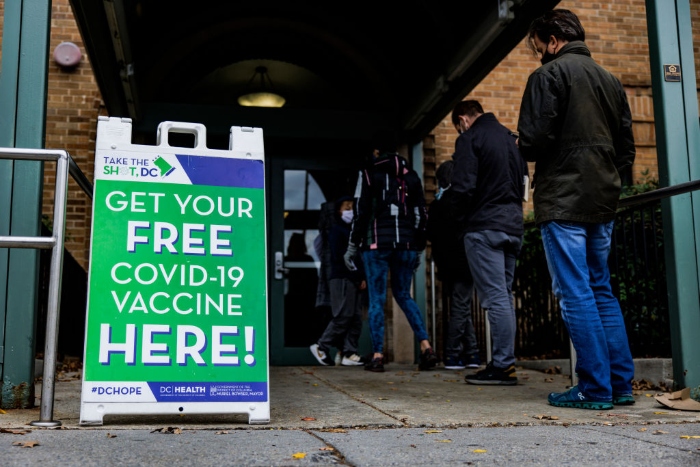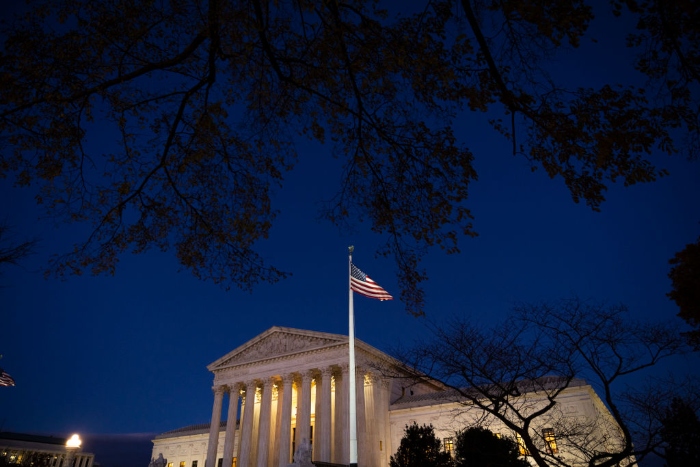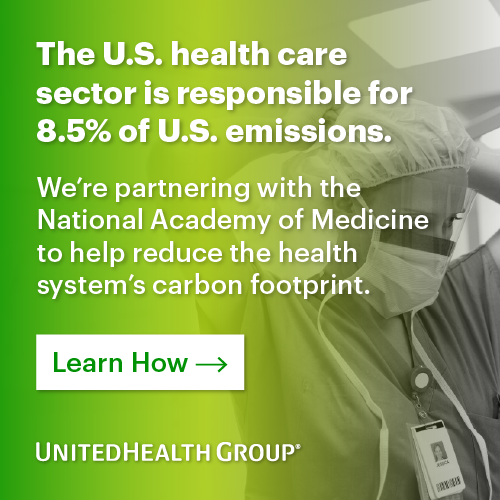| | |  | BY RENUKA RAYASAM | | With help from Joanne Kenen and Tyler Weyant
| 
People line up outside of a free Covid-19 vaccination site in the Hubbard Place apartment building in Washington, D.C. | Samuel Corum/Getty Images | NEEDLE POINTS — Some Republicans have justified their stance against Covid vaccine mandates by arguing that previously infected people have immunity against the virus. “The people that have thus far have not gotten, have not received the vaccine are not going to do it until this White House acknowledges natural immunity,” said Sen. Roger Marshall (R-Kan.) on Wednesday, shortly before the Senate voted to repeal the Biden Administration vaccine requirement for private sector employees. West Virginia, Arkansas and Florida all allow people who recovered from Covid to skirt vaccine requirements. More than half a dozen other GOP-led states are trying to pass similar exemptions. But how much protection does a previous Covid infection provide against future illness? “It’s certainly better than nothing,” Dan Barouch, who runs a Harvard virology lab, told Nightly. It’s not better than a vaccine, however. An infection generally triggers a broad response in the respiratory tract where the virus circulates — the nose, throat and lungs, said Prasanna Jagannathan, an infectious disease specialist at Stanford. That puts an infected person at a lower Covid risk than someone who is unvaccinated and hasn’t been infected. About half of previously infected adults are unvaccinated, according to a study of U.S. blood donors from January to August 2021. There’s evidence that immunity from infection is comparable to vaccine-induced immunity for about six months, the agency says. For mild infections that number might be closer to three months, according to researchers at University of California, Los Angeles. Vaccine-induced immunity is more targeted and consistent. That means protection from the vaccine is far more reliable, and infection also comes with magnitudes higher risks of long-term illness and death, said Ellen Foxman, an immunobiologist at the Yale School of Medicine. Two-dose vaccine immunity does wane after six months, but has continued to provide protection for most people against severe infection even with Delta. Early data suggests that Omicron is better at evading the vaccine’s defenses, but they’re not totally eliminated — and the protection against severe disease is still strong. Some previously infected people might not even have that temporary protection. More than one-third of people who had Covid produced zero protective antibodies. “Sure, being previously infected does afford you some protection,” Foxman said. Unlike vaccines, which have been rigorously studied for effectiveness against variants, it’s more complicated to test the protectiveness of immunity from infection because everyone produces a different reaction to the virus and antibody tests are unreliable predictors of immunity. “But are you really willing to gamble your health and the health of your loved ones when no one has studied your individual case?” When the Pfizer or Moderna vaccine gets injected into an arm, particles in the muscle engineer an immune response that is focused on the spike protein, which keeps the virus from infecting a person’s cells, Jagannathan said. Intuitively, it may feel like a broad response that comes from infection would be better than a targeted response from vaccination, but that hasn’t been the case, he said. Real-world data reveals the spike protein is especially important when it comes to protection against severe illness from new Covid variants. Researchers in his lab and others are still trying to figure out exactly why. “We know that immunity is short-lived and not as good as immunity through mRNA vaccines,” said Melanie Ott, director of the Gladstone Institute of Virology. One study of hundreds of previously infected Kentucky residents showed that the unvaccinated were more than twice as likely to be reinfected than those who got a shot after getting Covid. A study of blood donors in Manaus, Brazil , suggested that more than three quarters of the population had been infected by October 2020. That didn’t prevent the city of 2 million from experiencing a second Covid outbreak late last year and early this year, due to a new variant (Gamma) that sent people back to intensive care units even though they had been previously infected. Researchers are still trying to get a handle on how much immunity a Covid infection provides, but there’s just no reason for someone who recovered from Covid not to get a shot, Jagannathan said. Even though the mechanisms are different, one way to think about an infection is that it’s similar to getting one Covid shot, Barouch said. Early evidence from South Africa suggests that prior infection plus two Covid shots might offer as much protection as three Covid shots. “The infection provides some protection,” Ott said, “but with the vaccine it’s a super shot.” Welcome to POLITICO Nightly. Reach out with news, tips and ideas at nightly@politico.com. Or contact tonight’s author at rrayasam@politico.com, or on Twitter at @RenuRayasam.
| |
A message from UnitedHealth Group: UnitedHealth Group recognizes the environment is a key part of what makes the communities in which we live and work sustainable, viable and healthy. We are doing our part by committing to achieve operational net zero emissions by 2035 and working towards a paperless consumer and provider experience in the next 2 to 3 years. Learn more. | | | | | — New York to impose statewide mask mandate: All New Yorkers must wear masks inside any business that does not implement a vaccine requirement , Gov. Kathy Hochul said today, announcing one of the most stringent mandates in the nation. The new requirement, which takes effect Monday and will be reassessed on Jan. 15, comes amid a surge in Covid-19 cases throughout much of upstate New York, and as more cases of the Omicron variant are confirmed throughout the state. — SCOTUS allows clinics’ challenge to Texas abortion ban to proceed: The Supreme Court again declined to block an unusual, privately enforced Texas state law severely limiting abortions in a ruling today, though the high court’s majority said some challenges brought by clinics against the law could proceed. While the court’s conservative majority slammed the door on several legal avenues abortion clinics and doctors sought to use to nullify the statute, the justices said state courts could act to block the law, and federal courts may be able to limit some fallout from the statute, like the threat to doctors’ licenses.
| 
The Supreme Court at dusk. | Drew Angerer/Getty Images | — Trump campaign lawyer wrote two memos claiming Pence could halt Biden’s victory: A Donald Trump campaign lawyer issued two legal memos in the week before the Jan. 6 Capitol attack that claimed then-Vice President Mike Pence had the authority to refuse to count presidential electors from states that delivered Joe Biden the White House. The memos from then-Trump lawyer Jenna Ellis, which contain widely disputed legal theories about Pence’s ability to stop a Biden presidency, underscore Ellis’ promotion of extreme arguments that she promulgated amid Trump’s effort to reverse the election results. Her actions have remained largely below the radar as House investigators probe Trump’s inner circle.
| |
| | JOIN TUESDAY FOR A WOMEN RULE 2021 REWIND AND A LOOK AHEAD AT 2022: Congress is sprinting to get through a lengthy and challenging legislative to-do list before the end of the year that has major implications for women’s rights. Join Women Rule editor Elizabeth Ralph and POLITICO journalists Laura Barrón-López, Eleanor Mueller, Elena Schneider and Elana Schor for a virtual roundtable that will explore the biggest legislative and policy shifts in 2021 affecting women and what lies ahead in 2022. REGISTER HERE. | | | | | — CBO says Dems’ social spending bill would add $3T to deficit if programs made permanent: The nonpartisan Congressional Budget Office released a GOP-requested estimate that found the Democrats’ social spending package would add $3 trillion to the deficit — if its provisions are made permanent. Democrats have not committed to making all of the programs in areas like housing, prescription drug pricing, child care and home care permanent. However, they’ve repeatedly said they will fully offset any future extensions. — U.K. court permits Assange extradition to U.S. on spying charges: A British appellate court opened the door today for Julian Assange to be extradited to the United States by overturning a lower court ruling that found the WikiLeaks founder’s mental health was too fragile to withstand the American criminal justice system. The High Court in London ruled that U.S. assurances were enough to guarantee Assange would be treated humanely and directed a lower court judge to send the extradition request to the home secretary for review. The home secretary, who oversees law enforcement in the U.K., will make the final decision on whether to extradite Assange.
| |
| | A message from UnitedHealth Group:  
| | | | | EXIT STRATEGY — Nightly contributor Joanne Kenen emails: The Build Back Better Act that the Democrats are struggling to pass contains a little-known bipartisan measure that aims to benefit both public health and criminal justice reform. It would allow states to use Medicaid to give health insurance to incarcerated people for 30 days before their release from jail or prison. Experts say it would improve health on both sides of the bars. And that could help them stay out of prison, instead of going right back inside. People in jails and prisons have more chronic disease — conditions like high blood pressure, diabetes, hepatitis and TB — and very high rates of behavioral health problems like addiction and mental illness. Covid has also ravaged prisons. The risk of death and hospitalization in the first weeks out is many times higher than other people’s. And health challenges, mental or physical, raise the odds that they boomerang right back to the courthouse. “There’s tragic recidivism based on health status,” said Sara Rosenbaum, a George Washington University law professor and Medicaid expert. People without the right medical support, particularly for mental and behavioral health, are just more likely to get in trouble all over again. It was the risk of overdose in particular, and the opportunity to help people with substance abuse disorders or other mental illnesses to get into treatment in the community before they relapse, that propelled the proposal known as the Medicaid Re-entry Act, Sen. Tammy Baldwin, a Wisconsin Democrat who was one of the original co-sponsors, said in an interview with Nightly. “Historically, we used criminal models for drug addiction rather than a public health model in addressing addiction and substance use disorder,” Baldwin said. “This gives us an opportunity to pivot.” The Re-entry Act wouldn’t make more people eligible for Medicaid (though a separate BBB provision would close the Medicaid gap that has left poor people without coverage in the dozen states that reject Obamacare’s Medicaid expansion). Many people in jails and prisons are Medicaid-eligible, because of poverty, disability or both. But their coverage gets cut off while they are behind bars. And it doesn’t turn on automatically when people are released. In fact, it can take weeks to get coverage back in place. Establishing continuity in health coverage before their release — what’s called a “warm handoff” into community care — can make a big difference. “It’s a very big change for criminal justice, and has the potential to improve public safety goals,” said Vikki Wachino, who ran Medicaid near the end of the Obama administration and has since done a lot of work on this re-entry challenge. “When leaving prisons and jails, having supports including health care means people are more likely to rejoin families, participate in communities and not return to jail or prison.” A month of pre-release Medicaid smooths out the health care transition, connecting the inmates to health care and social services that can get them re-settled and off to a decent start in the community. People reentering the community, particularly if they’ve been incarcerated for so many years that their connections to the outside are attenuated, juggle multiple needs; housing, employment, connecting to parole officers and the like. Health care may get shoved to the bottom of the list, with a whole lot of very bad consequences. Some states, notably Ohio, have already begun testing ways of getting people pre-release care, and it’s seen as promising enough to take it national. Release, however welcome, is a high-risk moment. Sometimes prisoners are let out in the middle of the night, without drugs they need — insulin, mental health medications, or anti-addiction medicines, said Dan Mistak, director of health initiatives at Community Oriented Correction Health Services. For anyone who has stayed off drugs while incarcerated, relapse is common and overdose is a high risk. Even someone who tries to recalibrate to a lower dose after prolonged abstention, often makes a fatal miscalculation. The Medicaid provision would start two years after enactment, and it’s a state option, not a mandate. Still it’s likely that most states, across the political spectrum, would adopt it within the next few years. Continuity is preferable to having newly-released people “dropped with no parachute” on Medicaid’s lap, said Matt Salo, executive director of the National Association of Medicaid Directors. But putting pre-release Medicaid in place is complicated, and may not look the same in every state, noted the association’s federal policy director Jack Rollins. There’s a lot to work out, including data flow. “Correctional facilities systems are not designed to talk to Medicaid,” noted Rollins. But as Wachino pointed out: “Past criminal justice reforms” — the Prison Rape Elimination Act and the Second Chance Act, both signed by George W. Bush; the First Step Act signed by Donald Trump — “have been driven on the Hill by an interest in redemption. And I think that potential is here with the Re-entry Act. Redemption.” Nightly contributor Joanne Kenen, POLITICO’s former health editor, is the Commonwealth journalist-in-residence at Johns Hopkins School of Public Health.
| |
| | STEP INSIDE THE WEST WING: What's really happening in West Wing offices? Find out who's up, who's down, and who really has the president’s ear in our West Wing Playbook newsletter, the insider's guide to the Biden White House and Cabinet. For buzzy nuggets and details that you won't find anywhere else, subscribe today. | | | | | | | | |
| | | | 
Fans rush the court after the Rutgers Scarlet Knights defeat the Purdue Boilermakers 70-68 in a game at Jersey Mike's Arena in Piscataway, N.J. | Rich Schultz/Getty Images | HOOP NIGHTMARES — Nightly deputy editor Tyler Weyant emails: Maybe it’s a last-second, buzzer-beating shot to secure a great upset ( hello, Rutgers-Purdue Thursday evening). Maybe it’s defeating an in-state rival for the first time (we see you, James Madison-Virginia). The emotions take over, the shouting reaches a fever pitch, the clock strikes 0:00. And students stream onto the court. Court storming in college basketball is nothing new, but it does come with Covid risks far greater than the football fan swarms who prompted preseason hand wringing. “I think we can use the colloquialism, ‘It’s a whole other ballgame,’” said Christine Petersen, a University of Iowa epidemiologist. I interviewed Petersen in October during football season, when she told Nightly the outdoor nature of the games alleviated the risk for field-storming fans. For basketball, particularly during the biggest games of the season, the danger is simply greater, she said. “It’s an inside space, and you have a lot of people in that space. If it’s a sold-out game, and if the game leads to a buzzer beater — a lot of people screaming, jumping up and down and storming the court. That's a lot of expelled aerosol,” Petersen said. She compared the risk of a court storming to one of the earlier and most prominent indoor Covid case studies: A March 2020 choir practice in Skagit County, Wash . Time and again, the data has shown that infected people singing or shouting in a closed space can spread infection, a situation found frequently at top-level basketball games. Nor does the risk end at the final buzzer. “I am worried about what can happen in the arena. I am more worried about what happens after the game is over and they go to the bar,” Petersen said. Petersen’s advice for college hoops fans: Try going to worse basketball games. Big games with rowdy fans packed in tight quarters increase the risk that much more. Sign her up for the quieter dates on the calendar. Iowa-Western Illinois, when the students are on winter break, anyone? “I'm good with going in general if it’s not wall to wall, but I just am not ready to be shoulder to shoulder with a bunch of screaming people,” Petersen said.
| |
A message from UnitedHealth Group: The U.S. health care sector is responsible for 8.5% of U.S. emissions. Decarbonizing the health system can help limit the harmful effects of climate change and its impact on marginalized communities.
UnitedHealth Group is partnering with the National Academy of Medicine to meaningfully reduce the carbon footprint of the U.S. health care system.
See how we’re working to minimize our impact on the environment and help create more sustainable, viable and healthy communities. | | |
| |
|
| | Follow us on Twitter | | | FOLLOW US
|
| |

No comments:
Post a Comment